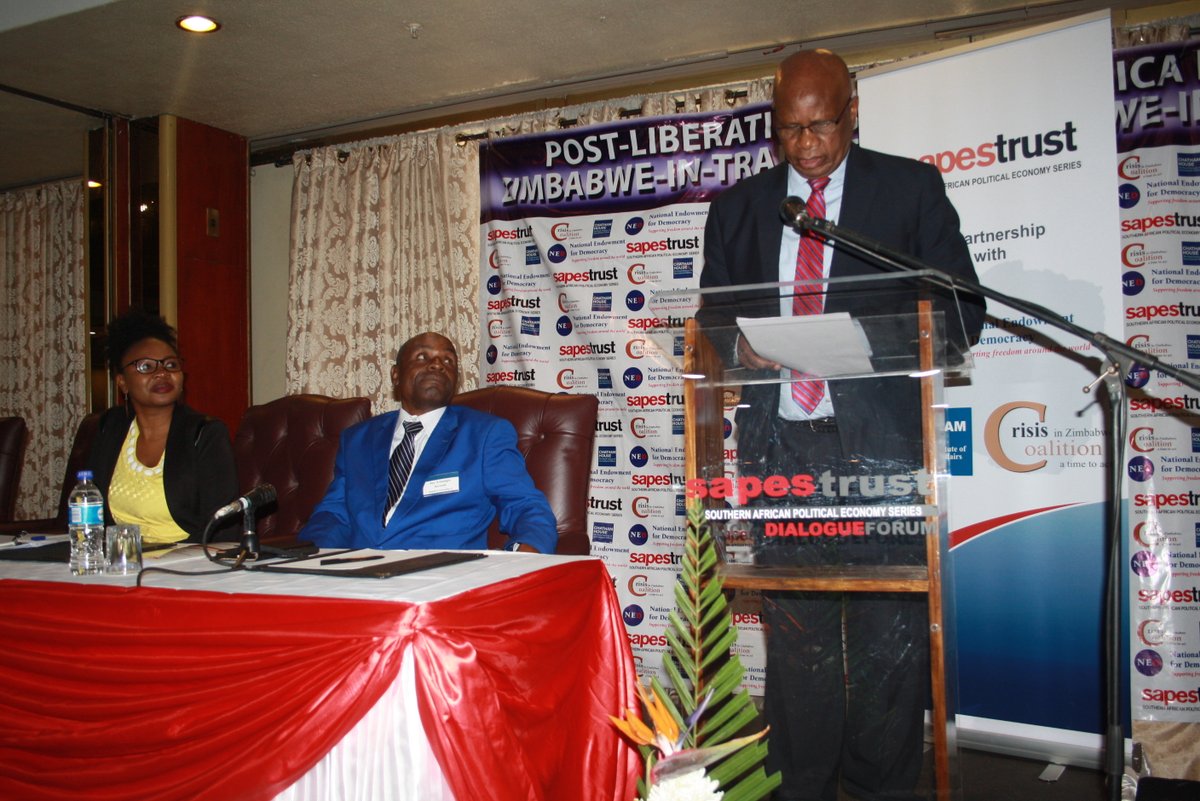By Byron Mutingwende
The Southern African Political Economy Series Trust (Sapes) and Crisis in Zimbabwe Coalition (CiZC) Conference on developing a dialogue for reform and reconstruction in Zimbabwe has pitted two major contending paradigms in a bid to resuscitate the economy.
On one side, the Minister of Finance, Patrick Chinamasa and his government colleagues at the conference raised the question of the economy and lack of investment as the major problem that needs to be tackled. On the other side, a significant section of the participants composed of mainly labour, professional organisations, civil society organisations and the academia raised questions of governance, rule of law and human rights as the key Achilles Heel facing Zimbabwe’s unending crisis. Despite the deep contestations on the genesis of the crisis, one key message that emerged across the divide was that dialogue is inevitable to resolve the impasse.
In his official opening and keynote address, Chinamasa recognised that dialogue was important in helping to inform Zimbabwe’s future policies but emphasised that it is mostly production that will move the country towards prosperity.
“In Zimbabwe, citizens are free to debate controversial issues openly and freely. Zimbabwe’s economy is facing major challenges and there is need to re-integrate the country into the global economy. Among the challenges is the low production. We need to implement measures that can push the production frontiers,” Chinamasa said.
He cited a skewed budget structure with 92% of the budget going to employment costs and recurrent expenditure. Coupled with this problem were the under-investment in infrastructure, the underfunding of social services, liquidity crisis, and overreliance on cash-based transactions, externalisation of foreign currency and a poor banking culture.
Chinamasa said efforts towards international re-engagement were key to the country’s sustainable development. In that context, Zimbabwe has cleared the International Monetary Fund (IMF) debt arrears and is honouring its obligations to the World Bank and the African Development Bank.
“International creditors and financial institutions should extend financial support to the private sector in order to create jobs and expand the tax base. The productive sectors should be supported to create a robust basis for Zimbabwe’s domestic mobilisation efforts,” Chinamasa said.
He said at the peak of the Zimbabwean economy, over 2 million people were employed in the formal sector but that figure has gone down top less than half a million people. He hailed the fact that over 100 000 farmers were now involved in tobacco farming with 350 000 artisanal miners contributing 40% of total gold deliveries, constituting a veritable revenue base to the country. Chinamasa blasted the misinformation and misrepresentation of the political affairs as debilitating against economic recovery efforts.
However, some civil society and private sector representatives reminded Minister Chinamasa, that in as much as production is important; the government could not afford the luxury of ignoring the democratisation, human rights and rule of law as fundamentals that require urgent attention to build confidence in both domestic and international investors.
Nyasha Chishakwe, the Executive Director of the Centre for Applied Legal Research said the Constitution, if abided to, was a transformative tool. However, he urged stakeholders to uphold its sacrosanctity and urged the state to implement the provisions of the Constitution in its totality.
Derek Matyszak, a Senior Researcher at the Institute for Security Studies said the Constitution on its own was not effective to cause a transition and said the country was not being run in accordance with the Supreme law.
“The Constitution is being actively undermined. There is a series of legislation coming before Parliament to undermine the advances of the Constitution. The amendment of the Electoral Act was meant to transfer voter registration from the Registrar General to the independent electoral commission but it took them three years to do so. Therefore, every single election done was in violation of the Constitution because the Zimbabwe Electoral Commission had no powers to register voters,” Matyszak said.
Jessie Majome, the Former Chairperson of the Portfolio Committee on Justice, Legal and Parliamentary Affairs said the constitution was being eroded on a daily basis. She noted that most minsters did not avail themselves for questioning before legislators yet the Constitution is the bridge to a democratic society.
Majome highlighted that the Labour Act amendment limited labour rights of women on maternity yet giving birth is a human right. She said that the tendency by the government to focus on ease of doing reforms and the economic blueprint, while violating human rights was an attempt to block constitutional gains made by women.
However, Dr. Pedzisai Ruhanya, the Director of the Zimbabwe Democracy Institute argued that the elephant in the room was the corruption and decomposition of the political paradigm by the authoritarian regime.
“The political and economic culture should be liberalised concurrently. Unless that relationship is democratised, there won’t be a meaningful change for the better. The major question at the moment is on who will take over power from President Mugabe in both the ruling party and state. This is leading to the policy inconsistencies in government and little effort is given towards addressing socio-economic problems and issues of livelihoods,” Ruhanya said.
Lawyer and international development expert, Brian Kagoro underlined the significance of the conference in that it brought to one table people of different political, social and economic persuasions, a phenomenon lacking in Zimbabwe’s public or national affairs. He emphasised that such a dialogue contributes towards building a culture of tolerance to divergent views with a collective view of getting Zimbabwe out of the challenges it is currently facing. Interestingly, Presidential Spokesperson George Charamba in the last instalment of the Nathaniel Mabheru Column in the Herald newspaper stated that all wars end at the table. Only time will tell whether this conference will be the table or part of the many tables that will end Zimbabwe’s unending impasse.
